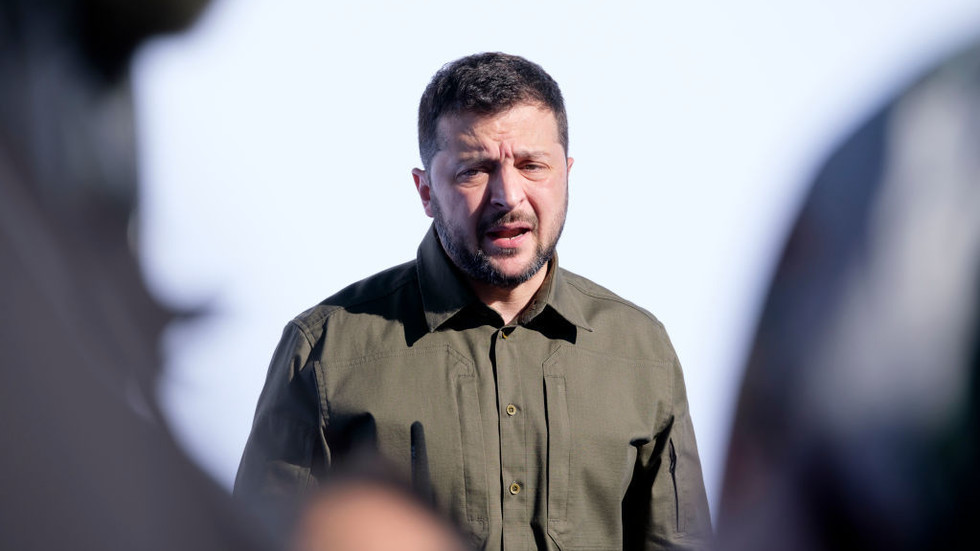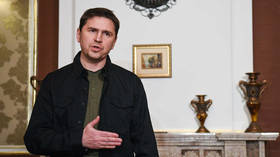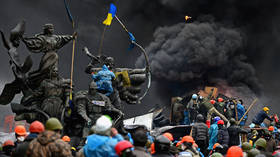
The actor-turned-politician feels let down by the same Western powers that have been inflating his ego for close to two years
By Tarik Cyril Amar, a historian from Germany working at Koç University, Istanbul, on Russia, Ukraine, and Eastern Europe, the history of World War II, the cultural Cold War, and the politics of memory. Follow Tarik on X @tarikcyrilamar

President of Ukraine Vladimir Zelensky of the third meeting of the european political community on October 5, 2023 in Granada, Spain. © Thierry Monasse/Getty Images
A recent, long article in Time Magazine presents itself as a deep dive into the world of and the state of mind of Ukraine’s President Vladimir Zelensky. In reality, it is a backhanded, withering attack.
Readers learn that Zelensky feels he is being, and –worse– is being let down internationally, that close aides not only doubt him but tell foreign journalists about it, that his actor’s panache has given way to a brooding anger, and that his refusal to face facts blocks any attempts to even think about a negotiated way out of the catastrophic war. Vital US support is quickly diminishing. The reception during Zelensky’s recent visit to Washington was frosty, while especially the problem of Ukraine’s eternal and crippling corruption is being broached with renewed insistence. Meanwhile, military officers back home are receiving presidential orders so detached from reality that they cannot even try to execute them.
In short, we see a lonely leader who will not accept that he is losing and is ready to sacrifice ever more of his country and people to his obstinacy. Psychologically, Zelensky’s denial of reality is understandable (though not forgivable). He bears much of the responsibility for Ukraine’s course of extreme, one-sided dependency on the West. It is true that others have contributed to this fiasco of a proxy war, in Ukraine and in the US, NATO, and the EU. But in Kiev, Zelensky is the man most to blame, because he did have the agency to prevent or end this national debacle.

He could have kept the one clear electoral promise he made (before netting a historic landslide victory in 2019): to make peace by compromise with the Donetsk and Lugansk People’s Republics, which were breakaway regions of Ukraine at the time. He could have taken the 2015 Minsk 2 peace agreement seriously instead of systematically sabotaging it (with Western encouragement). He could have let go of the notion of entering NATO, especially as the Washington-led alliance feeds his country just enough false hope to die for but hasn’t offered even a concrete prospect of membership. At this year’s Vilnius summit, with its humiliatingly empty promises, this was demonstrated again. Zelensky could have stopped listening to the West when the latter stonewalled Russia’s late-2021 initiative to avoid the war by a grand bargain. He could have refused to obey when the US instructed Ukraine to forgo a quick peace in spring 2022. None of the above would have been easy or without risk. But if you want to have it easy, don’t run for president. Or resign.
Even now, Zelensky could pick up the phone any day and call if not Russian President Vladimir Putin, then, for instance Brazil’s Lula da Silva to ask for genuine mediation to begin substantial talks. Indeed, it would be his duty to finally overcome his inflated ego and serve his country, instead of the West.
With so many good reasons for a bad conscience, Zelensky may never change. The personal failure he would have to acknowledge is too terrible. Instead, he keeps repeating the narcissistic mantra that the fate of the whole world depends on Ukraine (read: him), and that the war could go global if Ukraine does not win. Even once the war is officially lost, he may well spend his remaining days in exile blaming others and spinning stab-in-the-back legends. Indeed, the Time article shows that he has already started, singling out himself – and only himself – as the truest believer in Ukrainian victory and blaming the West for letting him down. In a sadly revealing metaphor, he describes his audiences outside Ukraine as losing interest in what they, he feels, perceive as a show that has run for too many seasons.
We cannot know what exactly is behind Time’s demolition of a figure it used to help exalt in a personality cult. Yet two things are obvious: The tone as well as the message have changed radically, and Time is not alone. Zelensky’s days as the darling of the West, toast of Hollywood, the embodiment of a fantasized hero hybrid concocted, Jurassic-Park-style, from the genes of Che Guevara and Winston Churchill, are over.
The reason for this shift is clear as well: The proxy war is failing and, in addition, Washington is now giving priority to helping Israel carry out its genocidal attack on the Palestinians and perhaps starting a larger war in the Middle East. Zelensky even confesses to what is, in effect, a form of “Israel envy.” For a man who believed he could learn from America’s favorite client state how to build a militarized, highly nationalist, and de facto authoritarian society, this as well must be bitter, if deserved.

In short, the Time take-down may be a sign of the US preparing the ground for moving against Zelensky. Like other proxy leaders before him, such as America’s former “miracle man” in (South) Vietnam, Ngo Dinh Diem, the Ukrainian president may find himself dispensable and dispensed with, whether by a more-or-less open military coup, a manipulated election (or its aftermath), or other means.
What has largely escaped Western attention, however, are Ukrainian reactions to the Time article. It has resonated in the media and among the political elite. The secretary of the powerful National Security and Defense Council, Aleksey Danilov, has unpersuasively dismissed the piece as factually misleading, while calling on the security services to identify the leakers contributing to it. That kind of damage control is no surprise.
Social media in Ukraine feature some voices blaming Russia. Political commentator Kostiantin Matvienko, for instance, speculates that the Time article is evidence of the West’s opponents’ (whom he calls, American neocon-style, the “axis of evil”) intention to take Zelensky down a peg because they, Matvienko wants to believe, fear his moral authority. How they got Time to do their bidding, Matvienko does not reveal. Bizarre as this reaction is, it illustrates the persistence, at least with some Ukrainian intellectuals, of an inflated image of Zelensky’s – and, with it, Ukraine’s international influence. National self-importance is by no means a uniquely Ukrainian issue. But, in the case of Ukraine, such illusions make ending the war harder.
At the same time, Ukrainian observers note the change in tone signaled by Time. For one journalist, Zelensky’s old image was that of a Tarot magician, a card associated with both powerful trickery and the ability to channel cosmic forces, while he now appears as a hermit figure, solitary and withdrawn. His “messianism” has given way to “fear of society.” Fanciful as it is, the imagery is striking: For some Ukrainians, at least, Time’s iconoclasm makes sense.
Examples could be multiplied. Inevitably they will also remain anecdotal. But here is the key point: If Time’s attack on Zelensky had occurred a year ago, Ukraine would at least have appeared united in rejecting it with indignation. That, however, is not the case now. Doubts and frustration are growing not only abroad but at home, too.

It would be wrong to jump to conclusions. If the US is really seeking to weaken Zelensky now, what is the purpose of that maneuver? To threaten and make him pliable? To replace him with a leader who will accept a compromise peace, so that Washington can focus on the Middle East and Asia (while leaving Ukraine and the EU in a mess)? Or so that the war can be pursued further under different management?
If Zelensky feels beleaguered and angry, does that reflect mostly the increasing depression and perhaps paranoia of a politician who fears the consequences of his failures? Or is he exhibiting a well-founded sense of real danger, from within as well as from his “allies” abroad?
The one thing that is certain is that the former poster boy of the great struggle for “Western values” has lost his aura. For Zelensky, in whose rise and rule the management of image has played an outsized role even by contemporary standards, that in and of itself is bad news.
The statements, views and opinions expressed in this column are solely those of the author and do not necessarily represent those of RT.




